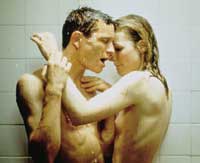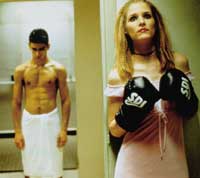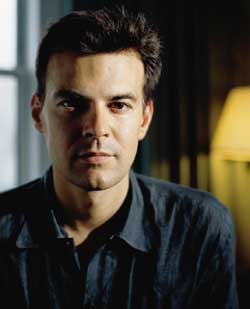FRANÇOIS AND HIS FRIENDS
With two films arriving in theaters this summer and two more out in video stores, the hardest-working director in France is set to conquer America. Water Drops on Burning Rocks, a witty and mordant homage to Rainer Werner Fassbinder, and Criminal Lovers, a perverse fairy tale, are more than enough evidence that François Ozon is one of France’s most exciting young directors. Quickly building a body of work that has critics comparing him to Hitchcock, Chabrol and, yes, Fassbinder, Ozon talks here with Peter Bowen about the common impulses behind the many different stories he likes to tell.
François Ozon Photographed by JoJo Whilden.
With two films – Criminal Lovers and Water Drops on Burning Rocks – slated for theatrical release this summer while his first feature, Sitcom, and his celebrated long-format short See the Sea are both out in video stores, French director François Ozon has clearly arrived in America. And he’s arrived here without much of the clingy residue of his French contemporaries, whose quiet, thoughtful dramas may have revived the French film industry but have also reaffirmed America’s suspicion of the serious art film.
Perverse, campy and cinematically smart, Ozon’s films introduce an entirely new voice to world cinema. Eschewing any specific style or tradition, Ozon instead works an attitude, and a rather nasty one at that. His two recent films – one a sleek modernist chamber piece, the other a mutated fairy tale – demonstrate how successfully Ozon manipulates such different forms to such similar effect.
Ozon’s films have consistently demonstrated a talent for confounding expectations. Critic after critic praised his short See the Sea for its technical facility and emotional maturity, even as they found it difficult to reconcile the film’s icy terror with the impish boy smiling back at them from festival catalogs. Lesbian and gay film festivals, which were instrumental in bringing Ozon’s work to America, showcased his films even as their audiences questioned whether his perverse characters embodied the positive role models they had plunked down good money to see. And although See the Sea, and the short it was packaged with for theatrical distribution, A Summer Dress, deservedly evoked comparisons to Alfred Hitchcock, Claude Chabrol and Eric Rohmer, audiences would find no repetition of those styles in his subsequent features.
left to right: Malik Zidi and Anna Thomson; Ludivine Sagnier
and Bernard Giraudeau in Water Drops on Burning Rocks.
This is not to say that Ozon’s work lacks consistency. Ozon says, "I get inspired by each film differently so that I can go deeper and deeper into that style. At the same time I am always telling the same story. It is the same principal, the same dynamic – a person comes outside to reveal something about the others. Contact with other people helps us to discover ourselves."
Ozon, himself openly gay, often re-creates this ur-story as a coming-out tale. As Ozon sees it, "Quite often my films depict an adolescent who had not yet discovered or come to terms with his desires. Often homosexuality comes about as a form of self-realization. It is not so much something coming from outside as something coming from inside. Everything is already in each character. I never pose the question of where the norm is, since I have always inverted it."
Ozon’s own talent for reworking and inverting cinematic forms has been honed since childhood. "My father has a Super-8 camera, and I shot some stuff in school. And I took some acting classes, but I was terrible, so I decided that I should be on the other side of the camera." After receiving a master’s degree in cinema from Paris’s celebrated film school FEMIS, Ozon has been making short films by any means necessary, churning out 30 Super-8 shorts, several in 16mm and video, seven 35mm shorts and now three features. It is an output that he half-jokingly worries makes others within the French film production economy "think that I am making too many films." But these films have also been models of economy and scale, in that he is constantly adjusting the size of his scenario to match his budget. Most recently, for example, he adopted the lean production style of early Rainer Werner Fassbinder by adapting an unproduced play Fassbinder wrote when he was only 19.
 |
 |
| Above: Salim Kechiouche and Natacha Régnier; Below: Jérémie Rénier and Natacha Régnier in Criminal Lovers. |
About the film’s key inclusion of a German language song that plays several times on the soundtrack, Ozon says, "For me the French are still very entrenched culturally. People in Germany talk about French culture, but nobody in France talks about German culture. So here I was going to force my audiences to listen to German because everybody thinks it’s such a horrible language."
If Water Drops on Burning Rocks demonstrates Ozon’s mastery of a minimalist chamber piece, Criminal Lovers betrays his penchant for the journalistic and fantastic. Explains Ozon, "It started with a true story, about two young children who went on a killing spree after having seen [Oliver Stone’s] Natural Born Killers, but I did not want to make a real story of it. Instead, I realized that there were lots of common points between true stories and fairy tales; they are both dark, dealing with similar themes – murder, incest, suicide." The story begins with Alice (Natacha Régnier) deciding to kill her classmate Saïd (Salim Kechiouche) with the assistance of Luc (Jérémie Rénier). But after the two have disposed of the corpse in the neighboring woods, they get lost, finally taking refuge in a woodsman’s hut and entering, as kids in the woods so often do, the realm of the fairy tale.
The film’s journey is, of course, as much cinematic as it is narrative. Not only was the crime inspired by a film, but the film models itself, according to Ozon, on "the cinema tradition, mostly American, of young criminals on the run — from Bonnie and Clyde to The Honeymoon Killers." But Ozon twists this tradition with his own campiness, cutting the romantic "couple-on-the-run" tale with the acidity of another Hollywood tradition. "I’ve always been fascinated by what are referred to as screen ‘bitches.’ I enjoy giving to female characters the same cruelty normally seen in men. Feminine manipulation is always much stronger, much more exciting." By the end, when Luc is called on to provide sexual favors for the ogre/woodsman, the film turns again into a lush homoerotic horror film, filled with references to Walt Disney and cannibalism.
For Ozon this shift from crime story to fantasty highlights not only the dark side of children’s imaginations but also the cathartic effects of cinema itself. As Ozon explains, "Fairy tales serve in acting as catalysts for the worries of children. I think that cinema can have the same function as the fairy tale. Everyone has violent impulses, murderous thoughts. Seeing these impulses acted upon on screen can be liberating. Fritz Lang said, ‘If I hadn’t made films, I might have become a criminal.’"
Ozon extends Lang’s logic by creating, if not a criminal cinema, than at least one of extreme provocation. In France, as well as in America, Ozon has gained a "bad boy" reputation, ready to flaunt and parade any perversion he sees fit in his films. In fact, this is a description that Ozon has given himself in elaborating the influences behind Sitcom: "To utilize all the different cinematic genres I love: family films, horror, gore, melodrama and farce, etc. In making this film I felt like a child who needed to play with dolls. To a certain extent, this is the film of a perverse child."
VOD CALENDAR


 See the VOD Calendar →
See the VOD Calendar →




